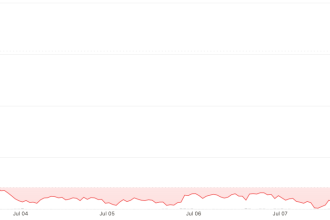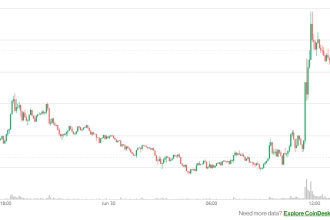The UK Plans Massive Sale of Seized Bitcoin Worth £5 Billion
Author: [Name – Since no author provided]
Date: [Current Date]
Category: Finance
Led by Chancellor Rachel Reeves and involving Home Office and law enforcement bodies, the UK government is planning to sell a substantial portion of its seized digital assets, predominantly Bitcoin worth approximately £5 billion ($7.1 billion), as a move to help address a £20 billion shortfall in the Budget.
Origin of the Assets
The primary assets in question stem from a significant law enforcement operation conducted in 2018. During this operation, 61,000 BTC were seized from a prominent Ponzi scheme based in China, run by ultimately convicted orchestrator Jian Wen. This seizure is now valued at over £5.4 billion, reflecting the significant rise in Bitcoin’s price since 2018.
Context and Precedent
The government’s proposal to monetize seized crypto holdings appears to have roots in media coverage. The Telegraph initially reported the plan, which is understood to be backed by several relevant sources. This initiative forms part of broader efforts to bolster government finances, but it risks establishing a precedent where state holdings of digital assets are sold, potentially impacting market sentiment and the position of victims seeking recovery.
Contested Claim
The sale is complicated by the fact that a significant number of victims of the Ponzi scheme are actively seeking the return of their illiquid BTC assets. Compounding this, Susie Violet Ward, CEO of Bitcoin Policy UK, has voiced strong objections, stating on the platform X that the legal status of these particular assets is still disputed. “The UK’s Bitcoin is still legally contested,” she argued, criticizing media coverage as “lazy,” and stressing that “Chinese authorities and victims are demanding it back. No sale can happen while that legal process is unresolved.”
Government Framework
In response, the Treasury is reportedly developing a specialized “crypto storage and realisation framework” to manage the sale of these assets. An initial £40 million contract for asset storage failed to attract any interested bidders, according to reports, leading to a reassessment and the development of a revised proposal.
Potential and Policy Pressures
Aidan Larkin, CEO of seizure management firm Asset Reality, sees potential value in these resources. “There is oil under our feet,” he stated, adding, “I do think digital assets will lead to a large windfall for government agencies and the public purse over the next five to ten years.” However, the decision comes against the backdrop of significant budgetary pressure facing Chancellor Reeves, exacerbated by a recent U-turn on welfare policy that has widened the deficit. Potential fiscal tightening, including tax increases, is now under consideration.
Concerns and Comparisons
The plan has ignited widespread financial debate across the nation. Critics warn the sale could have negative long-term consequences. “Selling these holdings to address a short-term budget deficit would send a concerning signal,” stated Jordana Walker of Bitcoin Collective in an open letter. Furthermore, some analysts draw comparisons to a previous government action, noting that the sale of similarly ill-timed assets (the UK gold reserves by Gordon Brown in 1999, sold when prices were low before a subsequent meteoric rise) ultimately cost the exchequer significant value.
Last updated: [Current Date]
Note: Replace "[Name]" and "[Current Date]" placeholders with appropriate information. Choose a suitable image for the <img> tag in <p>The woman behind the laundering case, Jian Wen, was...</p> if desired. Adjust CSS accordingly for styling.











